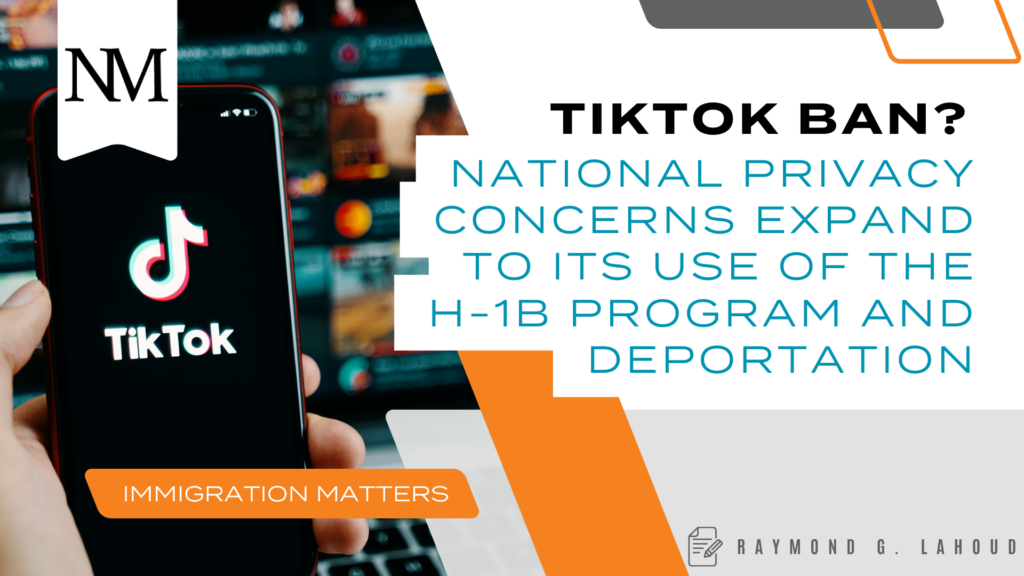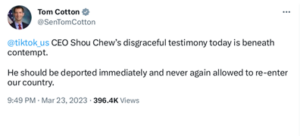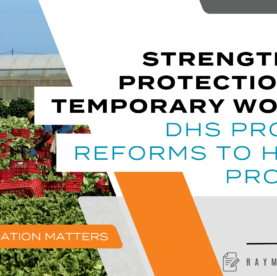TikTok Ban? National Privacy Concerns Expand to its Use of the H-1B Program and Deportation

In recent years, the social media app TikTok has become one of the most popular apps in the world. It has gained a massive following among young people, with over one billion active users worldwide. Its popularity has not been without controversy, however, particularly in the United States where it has been at the center of a national security controversy.
The concerns over TikTok stem from its ownership by the Chinese company ByteDance. There are worries that the app could be used to gather sensitive information on American citizens and potentially be a tool for espionage by the Chinese government. In response to these concerns, the Trump administration issued executive orders seeking to ban the app from the United States. However, these efforts were ultimately unsuccessful, and the Biden administration has taken a different approach to the issue.
In March 2021, the Biden administration announced it would conduct a review of potential national security risks associated with TikTok and other foreign-owned apps. The review was ordered to be conducted by the Department of Commerce and to focus on apps with ties to foreign adversaries. The review’s findings have not yet been released, but could potentially result in banning TikTok in the United States.
TikTok Responds
TikTok has repeatedly denied claims of wrongdoing or security risks. In response to the executive orders issued by the Trump administration, TikTok filed a lawsuit challenging the ban. The company argued that the ban was unconstitutional and lacked evidence of wrongdoing. The lawsuit was ultimately successful, and the ban was blocked by a federal judge. Despite this legal victory, the controversy over TikTok‘s potential national security risks remains. Lawmakers and national security experts continue to raise concerns about the app’s ties to China and the potential for the Chinese government to use the app for espionage purposes.
TikTok’s national security controversy has raised serious concerns about the app’s ties to China and its potential for being used for espionage purposes. Some lawmakers have called for TikTok to be banned in the United States, while others have proposed more limited measures such as requiring the app to be divested from ByteDance or subjected to stricter data privacy regulations.
Under Scrutiny: TikTok’s Sponsoring of Foreign Employees to Work in the U.S. with H-1B Visas
Critical to the success of TikTok in the United States has been the H-1B program, by which TikTok sponsors foreign employees to work temporarily in the United States.
The H-1B program is a visa program that allows American employers to hire highly skilled foreign workers in specialty occupations. Eligibility for the H-1B depends upon meeting the following requirements:
- The foreign employee must have a job offer from an American employer in a specialty occupation.
- The specialty occupation must require at least a bachelor’s degree or equivalent work experience.
- The foreign employee must possess the necessary qualifications, such as a bachelor’s degree or equivalent work experience, to perform the duties of the job.
- The American employer must pay the prevailing wage for the occupation in the geographic area where the job is located.
- The American employer must file an H-1B petition with the United States Citizenship and Immigration Services (USCIS) on behalf of the applicant.
In a letter to the United States Department of Homeland Security (DHS) seeking information on TikTok’s use of the H-1B program, Arkansas Senator Tom Cotton (R) raised concerns that TikTok’s H-1B program-sponsored employees “might have ties to the Chinese Communist Party (CCP).” Senator Cotton wrote that: “TikTok claims that it stores all TikTok US user data in the United States, and that its data centers are located entirely outside of China. In a Senate hearing, TikTok’s vice president added that TikTok has a US-based security team that handles access to user data. In 2022 alone, DHS approved over 570 new and continuing H-1B visas for foreign individuals to work at ByteDance and TikTok’s offices in California. When [this is] assessed with the security concerns that TikTok poses and the company’s repeated statements about US-based teams and data centers, having hundreds of [H-1B] foreign nationals working in those offices presents another potential threat.”
In response to Senator Cotton, DHS confirmed that in “[f]iscal Year 2022, USCIS approved 701 petitions (Form I-129, Petition for Nonimmigrant Worker) under the H-1B classification for new and continuing employment of foreign noncitizens to work at ByteDance and TikTok, which included 445 China nationals, 202 India nationals, and 54 nationals from other countries.”
Senator Cotton: End TikTok Employment Visas and Deport Its Executives
Concerned over TikTok’s H-1B sponsorship of foreign nationals, Senator Cotton, on March 16, 2023, introduced Senate Bill 872, titled, “A Bill to Identify Social Media entities under the Influence of Certain Foreign Entities and to take Measures to Protect the United States from such Entities, and for Other Purposes.” Known as the Safety on Social Media Act, the legislation would:
- blacklist and sanction untrustworthy social media services like TikTok that are controlled by adversary nations;
- force the Federal Communications Commission to remove blacklisted apps from app stores;
- require internet service providers to block access to the sites of those sanctioned companies;
- require United States nationals who are employees of social media services that like TikTok are controlled by adversary nations to register as foreign agents; and
- ban foreign employees of social media companies, such as TikTok, from eligibility for work visas to the United States, such as the H-1B.
Senator Cotton went further in a March 23, 2023 Tweet after the Congressional testimony of TikTok’s United States’ Chief Executive Officer, Shou Chew, demanding Chew’s deportation from the United States.

TikTok’s operations in the United States are under intense scrutiny at every level, from outright calls to ban the app in the United States, to censoring it, to preventing TikTok from accessing United States employment visas for its foreign employees, to deporting TikTok’s senior management.
What will happen to TikTok in the United States is not yet known, but the TikTok issue will remain at the forefront of the American political debate.




